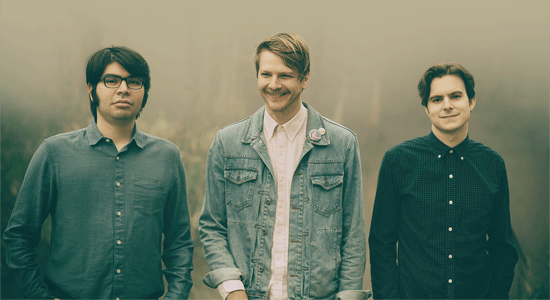Brass Bed awakens with guitars aplenty
In The Yellow Leaf (Modern Outsider) may not be Brass Bed’s debut, but it sort of feels like it. While reverb-saturated guitars have always been an integral part of the core trio’s aural repartee, they utterly define its fourth release, prompting legitimate comparisons to the majestic triple-stacked sonic squall pioneered by the likes of My Bloody Valentine and Swervedriver.
“Having two guitars doing the heavy lifting is relatively new for us—which is relatively weird considering that I’ve always been a nerd about guitars,” says guitarist Christiaan Mader.
And while Mader concedes that Brass Bed has “grown into” a more ’90s sound, he stands by Brass Bed’s singular influence. “The big-bang moment was discovering Wilco,” he says. “That’s when we started to do bedroom recordings.”
Guitarist Jonny Campos concurs. “When (drummer) Peter (DeHart) and I graduated from high school, we were taking our senior trip camping in the Ozarks. Our buddy played Yankee Hotel Foxtrot, and we were like, ‘Eh, that was fine.’ Then we started smoking more pot, and we discovered it was easier to take a folk song and make it weird than it was to write a pristine Beatles pop song.”
Given the group’s central Louisiana upbringing, the popular take on Brass Bed is that it has been pumping out great music in a vacuum. That’s until 2013’s The Secret Will Keep You, which laid the alternately dreamy and angst-ridden foundation for the more fully realized music to come. “Lafayette’s not really a big place, and it’s not really a small place,” says Mader of his hometown. “We didn’t really get the sort of cutting-edge things we experienced later on. I wasn’t exposed to stuff with the fluidity people get in bigger cities, and I certainly think that contributed to us doing our own thing.”
That might explain why Brass Bed still feels like a fresh entity—even four albums in and with its members now in their 30s. “The music we were exposed to before we could search the internet was the stuff our alternative radio station or older siblings were offering us,” says DeHart. “We’re definitely a product of the ’90s.”
—Hobart Rowland







